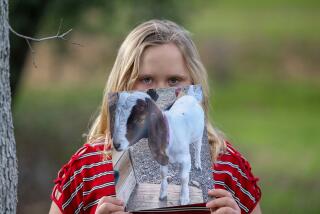Zimbabwe hunter: ‘I regret shooting a lion named Cecil’
- Share via
Reporting from Johannesburg, South Africa — A professional hunter in Zimbabwe defended himself Wednesday against charges stemming from his role in the killing of a well-known lion known as Cecil, saying the accusations were frivolous and wrong.
Theo Bronkhorst, who helped American dentist Walter Palmer hunt Cecil with a bow and arrow, said there would have been no outrage had he killed any other lion in the same circumstances.
“It’s been a traumatic experience and I wish it was over,” he told journalists outside court in Hwange, Zimbabwe.
The hunter appeared in magistrate’s court to answer charges by Zimbabwean authorities that he failed to prevent an illegal lion hunt. Zimbabwean authorities are seeking the extradition of Palmer, who has admitted killing the lion and said he would cooperate with the investigation.
According to authorities, the killing was illegal because the game farm where Cecil was shot had no lion quota from Zimbabwe’s wildlife officials. The case is controversial because Cecil, a dominant animal that led a pride and was said to be a tourist draw in Hwange National Park, was allegedly lured from the park with bait, shot by Palmer with a bow and arrow, and wounded. It wandered, injured, for 40 hours before Palmer finished it off.
Says Palmer sought elephant
Palmer then asked Bronkhorst if he could shoot a huge elephant, but none of those available to be killed was big enough for him, Bronkhorst said in an interview with the Daily Telegraph last week.
The case was postponed to September. Bronkhorst has been suspended from hunting pending the trial’s outcome.
Bronkhorst has pleaded not guilty. He told journalists at the court he did not believe he had done anything illegal.
“I regret shooting a lion called Cecil. That was never the intention. I didn’t know he existed,” Bronkhorst said in an interview with NBC News. “Any other lion, I don’t think it would have been a problem.”
Argument for lion hunting
The pro-hunting lobby maintains that hunting contributes to lion conservation by encouraging game farmers in southern Africa to maintain animal populations that hunters can shoot and kill.
Bronkhorst, who wore dark glasses and a cap, mounted the same argument Wednesday.
Hunting “is an integral part of our country and it’s got to continue and if we do not use wildlife sustainably, there will be no wildlife,” he told journalists.
Bronkhorst claimed in last week’s interview with the Telegraph that he panicked when he saw the lion was collared, indicating it was protected. He said he hung the collar in a tree, instead of turning it in to wildlife authorities. He then beheaded and skinned the lion so that Palmer could have them mounted as a trophy.
Palmer has appeared to blame Bronkhorst for the illegal hunt, claiming he believed the hunt was legitimate.
Zimbabwe has an extradition treaty with the United States, so if Zimbabwe authorities proceed with their stated plan, he may face extradition proceedings.
Fears for tourist industry
Zimbabwe tour operators have expressed concern that the global furor over the illegal hunt will harm the tourist and hunting industry. Americans form the bulk of trophy hunters in southern Africa and around 15,000 travel to the region each year to kill animals including monkeys, giraffes, hippos, rhinos, lions, leopards, buffalos and others.
Palmer reportedly paid around $50,000 to kill the lion in an industry that had been expected to contribute $45 million to the economy this year, although that may not be realized now. Authorities have since banned hunting in areas adjacent to the park.
South African conservationist John Varty wrote an open letter to Bronkhorst Monday, widely circulated on social media, claiming professional hunters like him were unethical because they offered clients the biggest animals for a higher price. As a child growing up in a hunting family, one in 30 hunts would be successful, and miles were walked for every animal shot.
“When you sell in Vegas and other places, your brochures advertise that you can get the biggest lion for your client. It is well known that wealthy clients will pay extra for an extra-large lion and elephant above 60 pounds ivory,” he said in the open letter. “I trust you will tell the court how much Palmer paid you over and above the normal head tax for an extra-large lion. Palmer is wealthy, his mentality is money can buy him big trophies. So he offers more money for big elephant, big lion and big bear. I am suggesting that this is where your ethics evaporate.”
Varty also suggested it was inappropriate to kill a dominant lion because it wreaked social havoc in the pride that was left behind. Moreover, he said it was inhumane to kill an animal of that size with a bow and arrow.
“You know that a .375 or .458 should be the weapon used. However, you allow him to shoot with a bow. Why? Because he pays you more money! Palmer shoots with a bow and arrow to feed his giant ego. Consequently, he wounds the animal.
“Every which way you turn, you are compromised. You are shooting a dominant male with an inferior weapon because he is paying you more money.”
Follow @RobynDixon_LAT for news from Africa
MORE ON CECIL THE LION:
After the killing of Cecil the lion, Delta Air Lines says it won’t ship hunting trophies
Zimbabwe to seek extradition of American dentist who killed Cecil the lion
Killing of Cecil the lion spotlights reports of corruption in southern Africa
More to Read
Sign up for Essential California
The most important California stories and recommendations in your inbox every morning.
You may occasionally receive promotional content from the Los Angeles Times.










